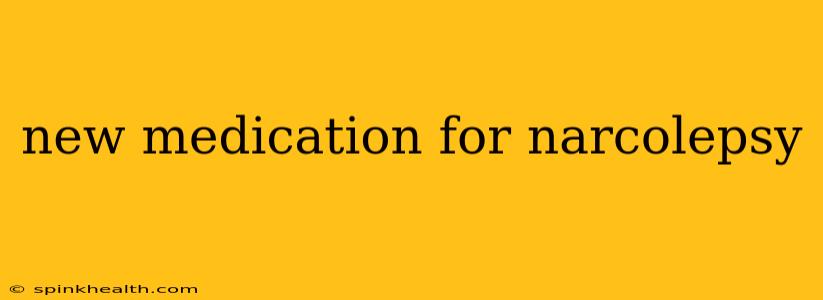New Medications on the Horizon: A Deeper Dive into Narcolepsy Treatments
Narcolepsy, a chronic neurological disorder, can significantly impact a person's daily life. Characterized by overwhelming daytime sleepiness and sudden sleep attacks, it can feel like a constant battle against exhaustion. For years, treatment options have been limited, but recent advancements offer a glimmer of hope for those living with this debilitating condition. Let's explore the landscape of new medications and treatments emerging for narcolepsy.
This isn't just about finding a quick fix; it's about improving quality of life, reclaiming lost productivity, and fostering better overall well-being. This journey into the world of narcolepsy medications will cover existing treatments and what's next on the horizon.
What are the current treatments for narcolepsy?
Currently, the mainstay of narcolepsy treatment revolves around stimulant medications like modafinil (Provigil) and armodafinil (Nuvigil), which help improve wakefulness and alertness. These are often the first line of defense, proving effective for many individuals. However, they aren't a one-size-fits-all solution, and some individuals may experience side effects or find them insufficiently effective in managing their symptoms. Beyond stimulants, other medications targeting cataplexy (sudden muscle weakness) and sleep disturbances are also used. This often involves a multi-pronged approach tailored to individual needs, underscoring the complexity of the condition.
What are some new medications in development for narcolepsy?
The research community is actively pursuing new avenues to improve narcolepsy management. While many medications are still in the clinical trial phases, several promising candidates are emerging. This ongoing research focuses on several areas: improving wakefulness, reducing cataplexy, and addressing the underlying neurobiological mechanisms of the disorder. Some focus on orexin/hypocretin systems while others explore novel approaches. The development of these new medications is driven by the need for better tolerated and more effective treatments, along with a focus on mitigating side effects associated with existing options.
What are the side effects of narcolepsy medications?
Side effects vary depending on the specific medication. Stimulants, for instance, can sometimes cause anxiety, insomnia, headaches, or gastrointestinal issues. Other medications may have different side effect profiles. It's crucial to discuss potential side effects with a healthcare professional, as careful monitoring and management are essential. The development of new medications aims to minimize adverse effects while enhancing efficacy.
How are new medications for narcolepsy tested?
Developing new medications is a rigorous process involving several phases of clinical trials. These trials meticulously assess safety, efficacy, and tolerability. Researchers compare the new treatment to existing standards of care, ensuring that any advancements are demonstrably beneficial. This rigorous testing and review process aims to guarantee patient safety and the development of effective therapies.
Are there any non-medication treatments for narcolepsy?
Beyond pharmaceuticals, lifestyle modifications can significantly impact narcolepsy management. Regular sleep schedules, adequate sleep hygiene, and regular exercise can significantly improve symptoms. Cognitive behavioral therapy (CBT) can also be beneficial in managing sleep disorders and daytime sleepiness. This holistic approach emphasizes the importance of integrating various strategies to maximize therapeutic outcomes. This comprehensive approach underscores the collaborative effort required for effective narcolepsy management.
What is the future of narcolepsy treatment?
The future of narcolepsy treatment is bright, with ongoing research promising more effective and better-tolerated medications. A deeper understanding of the underlying neurological mechanisms driving the disorder fuels the search for targeted treatments. This ongoing research and development offer renewed hope for individuals struggling with this challenging condition. The journey towards a better understanding and management of narcolepsy is an ongoing process, driven by research and the commitment of healthcare professionals.
This exploration into the realm of narcolepsy treatments provides a glimpse into both established and emerging therapies. Remember, this information is for educational purposes and should not be considered medical advice. Always consult with a healthcare professional for accurate diagnosis and personalized treatment plans. The path to effective narcolepsy management is a collaborative journey, requiring open communication and a holistic approach.

